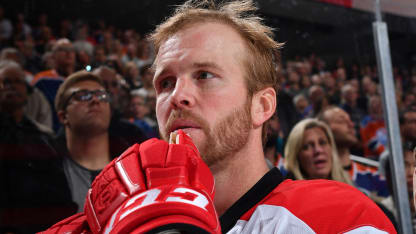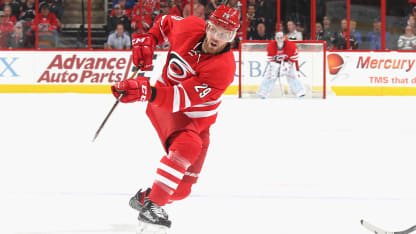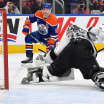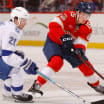RALEIGH, N.C. -- Bryan Bickell went into the doctor's office alone.
During the drive there his two young daughters fell asleep in the back seat of the car. So Bickell's wife, Amanda, remained with them while the Carolina Hurricanes left wing went to get the diagnosis that would change their lives.
Bryan Bickell taking life with MS one day at a time
Hurricanes forward, with support from wife, doctors, hoping to return to lineup this season

© Andy Devlin/Getty Images
"I really thought nothing of it because this was not the first time he's had tests done," Amanda Bickell said.
Bryan Bickell had been through myriad tests during the previous 18 months for various reasons. Although there were diagnoses -- dizziness that initially was thought to be vertigo later was called an ocular issue -- and treatments, Bickell continued to feel something wasn't right.
By the second week of November he was certain of it. What began as pain in his shoulder developed into numbness in his right arm and leg, along with some dizziness.
After being listed as a healthy scratch for three games, Bickell had an episode during a pre-game skate at Prudential Center in Newark, New Jersey on Nov. 8 and pulled himself off the ice.
So he went for more tests.
Read: Bryan Bickell doing best to help others with MS
An MRI revealed lesions on Bickell's brain and spinal cord. Josh Bloom, the Hurricanes head physician, delivered the news that Bickell has multiple sclerosis.
"It was kind of a shock," Bickell said. "I got my MRI and a day later Dr. Bloom brought me into his office and you could just kind of see [from] his face and his reaction, his body language, something wasn't right. And then he told me I had MS.
"I was like, 'Wow. I don't really know much about MS.'"
The website for the National Multiple Sclerosis Society defines MS as "an unpredictable, often disabling disease of the central nervous system that disrupts the flow of information within the brain, and between the brain and body."
The cause is unknown and the progress, severity and symptoms vary unpredictably from one person to another.
The disease most often is diagnosed between the ages of 20 and 50. Bickell will turn 31 on March 9.
Upon hearing the diagnosis, a multitude of thoughts rushed through Bickell's head. First among them was concern for his and his family's quality of life. He also couldn't avoid wondering if he'd play hockey again.
"It definitely goes through your mind," he said. "You don't want it to end like this. That's why I'm pushing to get back on the ice. If I have one game or five years left, I don't know. It's all up in the air."
Unable to tell his wife the bad news himself when he got back to the car, he opened the driver's side door and asked, "Can you go in there and talk to the doctor?"
"He didn't tell me why," Amanda said. "He didn't say anything."
When Amanda heard the diagnosis from Bloom, she also was stunned. Then she asked a number of questions about what the diagnosis meant and what the next steps would be before returning to Bryan in the car.
"When I came out he just kind of stared at me. He didn't have any words," Amanda said. "I think he was kind of in shock. I just hugged him and said, 'We'll be OK one day at a time.' That's really what we've done since."
\\*
Before beginning an interview with NHL.com, Bickell casually ripped a bandage off the inside of his left elbow and rolled down his shirt sleeve, concealing the lone clue that he's just returned from receiving his second intravenous dosage of Tysabri. Bickell is administered the drug, which prevents white blood cells from entering the brain and spinal cord to help limit the debilitating effects of MS, once a month at Raleigh Neurology, a treatment center across the street from PNC Arena.
Although Bickell said, "I don't know how to spell it," he knows he's been feeling a lot more like his old self since he started taking Tysabri. His treatments will continue indefinitely, as long they are helping.
"I'm feeling good," he said last week. "[From] a couple months ago it's a 180 [degree] change. I'm feeling a lot better. I've been on the ice a couple times. My lungs, I don't know where they went, but I've got to find those soon to get back in the lineup."
Bickell said he would love to make it back to help the Hurricanes drive to earn a spot in the Stanley Cup Playoffs. He resumed skating two weeks ago and has practiced a few times in a yellow, non-contact jersey.
"I hope I can join the team and make that push for the playoffs because we're so close," said Bickell, a three-time Stanley Cup winner with the Chicago Blackhawks before he was traded to the Hurricanes on June 15, 2016. "I know this team needs it, and personally, that's where I love playing, is in the playoffs. So hopefully [I can come back]. If it's this year, next year, we don't know."
So many questions remain to be answered before Bickell can play again:
How will his body react to the increased physical stress of a full practice? Will any of his symptoms return? Will he experience any side effects from his medication?

© Gregg Forwerck/Getty Images
"I think in this process there's a lot of unknowns," Hurricanes general manager Ron Francis said. "That's why we're taking it one day at a time. The key thing I said to Bryan is, 'Just be honest and let us know how you're feeling.'"
Tysabri is the same drug that helped former Minnesota Wild goaltender Josh Harding, who was diagnosed with MS in 2012, to continue his career in 2012-13. Bickell and Harding have talked on the phone and exchanged texts during the past two months, providing Bickell with some first-hand advice about what to expect.
Harding eventually had to stop taking Tysabri because of a reaction he had to the drug and, on the recommendation of his doctors, stopped playing following the 2013-14 season. Bickell understands that because of the unpredictability of MS there's no way of knowing if the same fate awaits him.
"Different people react differently to different drugs and I've been reacting good and we'll see how it goes," Bickell said. "Time will tell what's going to happen."
Despite the uncertainty, Bickell remains remarkably optimistic. But there was one brief period after the initial diagnosis and before he began receiving treatments when Bickell allowed negative thoughts to creep into his head.
He worried he'd have an episode while he was carrying one his daughters, Makayla, 2, and Kinslee, 6 months, up the stairs and fall, and wondered what his family would do if the MS became more debilitating.
"He's asked me at one point, 'Are you scared? What's going to happen if next year you're taking care of three people rather than just the two kids and I'm in a wheelchair?'" Amanda said. "I'm like, 'I'm not thinking about that. It's not really in my mind at the moment.' I just decided when we found out that positive is the best way to go. So that's me thinking positive and him thinking positive and just taking it day by day."
Bickell saw three doctors, including Bloom, plus one at Duke University and a specialist in New York. From talking to the doctors, doing some research of his own and talking to others with MS, including Harding, Bickell said he's learned the disease is, "livable and treatable, and hopefully a couple years down the road it will be curable."
"Just the way the drugs have been going, it's going in the right direction, and hopefully, everything will work out here soon. For me, we caught it really early. If it was farther down the line it would have been a different story. But I feel normal. I just have some tinkering to do here and there."
In a way, Bickell's diagnosis has been freeing for him because he hadn't felt right since the end of the 2014-15 season and didn't know why. After watching him struggle, the Blackhawks put him through waivers twice last season and he played 47 games with Rockford in the American Hockey League, his first game in the minors since 2009-10.
Bickell said there is no way of knowing if the vertigo or ocular issue he experienced while with the Blackhawks was related to his MS.

© Gregg Forwerck/Getty Images
"But I know that from what I was feeling a couple weeks leading into me finding out that I had MS it was different," he said. "It wasn't like it was a year and a half ago, but could it have led into other things? We just don't know.
"The knowing now is the biggest thing."
For that reason, Amanda said, "Honestly, last year was a lot harder than it is this year even though this year we found out he has MS.
"Trying to figure out all of these things, it got to the point of, 'OK maybe you need to see a therapist because maybe it's in your head.' So it really, really is kind of a relief, you don't want to say this, but to find out there actually is something wrong."
\\*
The biggest relief, of course, is that Bickell is feeling normal again since beginning treatment in December. After having to take some time off from exercising, he was able to start working out off the ice, including riding a stationary bicycle.
Now that he's back skating, his optimism is growing.
"I've been out for injuries and for things I've had in my career and this one's obviously a little tougher circumstances and I think it just made you miss it that [much] more," he said. "Because you don't know what's going to happen, if it's, I step on the ice and that could be the last time I do. I think that's going to drive me this time.
"Obviously to have something like this in my life kind of throws a curveball in. I think it just personally pushes me that much harder to prove myself wrong and people wrong that I can do this."
Bickell said the Hurricanes have been first class in supporting him and essentially have left it up to him and the doctors as to when he takes each step in his recovery. Francis has been careful not to put any pressure on Bickell, but does believe he'd be able to help the Hurricanes playoff drive if he's able to return.
"That's part of the reason why we got him during the summer," Francis said. "He's a big guy (6-foot-4, 223 pounds) with playoff experience and Stanley Cup [titles] under his belt. He's been a great addition in our locker room with just his demeanor before the diagnosis and even since. The guys have a ton of respect for him.
"Again, we're not putting any pressure on him. We'll take it one day at a time and see how things progress moving forward."
That's been Bickell's approach since that day in the car outside Bloom's office. Through it all, Amanda has been by his side.
"She's my rock," he said. "She's behind me 100 percent, whatever it takes."
Although having her husband at home to help out and spend more time with his daughters has been another example of them turning a negative into a positive, Amanda said she knows how much Bryan wants to be back on the ice and knows that's where he belongs.
"He's very positive about it and we continue to stay positive in the family," she said. "He's so determined. The doctors said that he wouldn't be back on the ice for 5-6 months after his treatment and it's been a month and he's already back on the ice and he's like, 'I'm feeling good.' Nothing stops that guy."

















